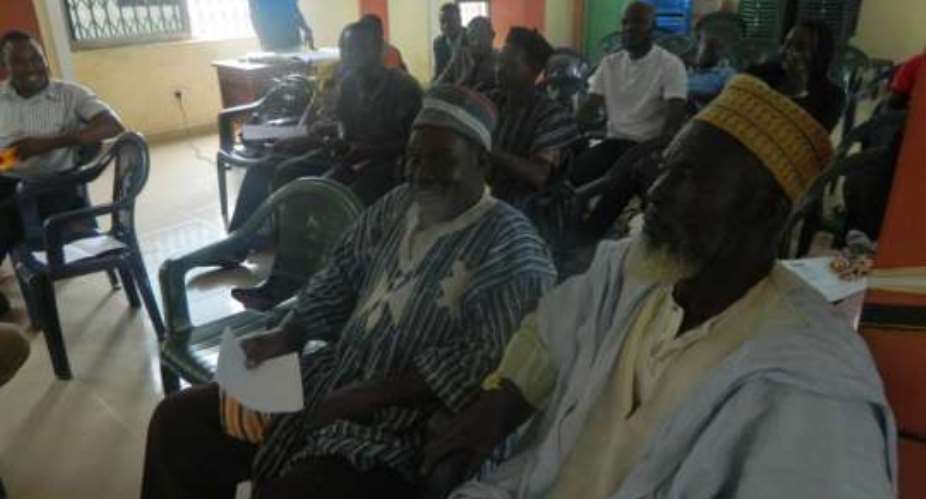Navrongo (UE), July 21, GNA - The Kassena-Nankana Municipal Assembly and the Kassena-Nankana West District Assembly in the Upper East Region have pledged to mainstream clean energy plans for cooking into their Medium Term Development Plans.
In spite of the fact that 2010 statistics available at the Renewable Energy Unit of the Ministry of Energy revealed that more than 56 per cent of final energy was used for cooking and heating, most of the Municipal and District Assemblies (MDAs) in the region had not factored into their Medium Term Development Plans, clean energy for cooking.
Following advocacy programmes embarked upon by the Organisation for Indigenous Initiatives and Sustainability (ORGIIS), an environment focused Non-Governmental Organization, the aforementioned MDAs have pledged to prioritize clean energy for cooking.
Speaking at separate fora, organised at Navrongo and Paga by the NGO, the Municipal Planning Officer for the Kassena-Nankana Municipal, Mr Andani Iddrisu, thanked the NGO for drawing the attention of the MDAs to the issue and stressed that his outfit would ensure that the area was given special attention in the planning and implementation process of the Assembly.
He expressed the hope that the promotion of cleaner energy for cooking systems such as Liquid Petroleum Gas (LPG) and improved cooking stoves would help address environmental degradation, mitigate climate change and also help curb diseases like Tuberculosis and lung cancers often associated with traditional cooking in the area.
The two District Planning Officers commended SNV, the Netherlands Development Organization for choosing to provide funding support for the implementation of 'Voice for Change Partnership Project' which is aimed at implementing the cleaner energy components including; LPG and other improved cooking stoves.
The Gender Officer of the Kassena-Nankana West, Ms Abiba Karim, stated that women and girls had to travel to far distances in search of fuel wood for cooking which she noted often affected the girls' education.
During forum sessions, the participants who included Assembly Members, District Planning Officers, District Gender Desk Officers, Area Councils Chairs and Traditional rulers, expressed fears about the health problems such as Tuberculosis, Lungs cancer, poor sight, skin diseases associated with the Traditional cook stoves and fuel wood.
They stated that among the major factors that discouraged many people from patronising the improved cooking systems was due to the lack of accessibility, affordability, efficiency and sustainability of the products.
'The benefits of fuel subsidies are hardly enjoyed by the target group as LPG is used by commercial vehicles and Kerosene adulterated with diesel and sold for the price of diesel.
'The high cost of the cooking device and accessories and safety concerns in the case of LPG are also among the major factors that discourage many people from adapting to the improved energy cooking systems'
The Participants called on government to subsidise the clean energy cooking systems and ensure that they reached the most remote rural areas to benefit the targeted people.
They further stated that the current retail model of LPG supply could not ensure increased use of the product throughout the country and stressed the need for it to be repackaged in either water dispenser or coca cola retail model and made available in shops for people to patronise.
The participants further proposed that, the poor majority who could not afford cleaner fuel should be encouraged to use the local energy sources in an efficient and sustainable manner by using modern methods such as improved technologies and techniques.
While calling for the total removal of subsidies on LPG and using such funds to support LPG devices and accessories to make them affordable, the participants called for the implementation of programmes that would help promote LPG use in the domestic, commercial and public institutions such as schools.
They called for the Institutionalisation of a National Policy to regulate charcoal production, provide alternative livelihoods, tree planting and reforestation, do more education on the use of LPG as well as local NGOs encouraged to embark on sensitisation programmes about the health effects of Traditional cook stoves including safety usage.
Mr Julius Awaregya, the Coordinator of the NGO who called on the MDAs to enact by-laws on the environment stated that research conducted by his outfit and other partners in some selected communities in the two Districts revealed that majority of women were still using cow dung and millet stocks for cooking.
He mentioned some of the communities as Akurugu Dabo, Natognia and Manyoro, Kandiga, Mirigu among others.
He assured the stakeholders that all their inputs would be put together and forwarded to the National Development Commission and the Energy Commission to be considered for implementation.
GNA
By Samuel Akapule, GNA





 Akufo-Addo commissions Phase II of Kaleo solar power plant
Akufo-Addo commissions Phase II of Kaleo solar power plant
 NDC panics over Bawumia’s visit to Pope Francis
NDC panics over Bawumia’s visit to Pope Francis
 EC blasts Mahama over “false” claims on recruitment of Returning Officers
EC blasts Mahama over “false” claims on recruitment of Returning Officers
 Lands Minister gives ultimatum to Future Global Resources to revamp Prestea/Bogo...
Lands Minister gives ultimatum to Future Global Resources to revamp Prestea/Bogo...
 Wa Naa appeals to Akufo-Addo to audit state lands in Wa
Wa Naa appeals to Akufo-Addo to audit state lands in Wa
 Prof Opoku-Agyemang misunderstood Bawumia’s ‘driver mate’ analogy – Miracles Abo...
Prof Opoku-Agyemang misunderstood Bawumia’s ‘driver mate’ analogy – Miracles Abo...
 EU confident Ghana will not sign Anti-LGBTQI Bill
EU confident Ghana will not sign Anti-LGBTQI Bill
 Suspend implementation of Planting for Food and Jobs for 2024 - Stakeholders
Suspend implementation of Planting for Food and Jobs for 2024 - Stakeholders
 Tema West Municipal Assembly gets Ghana's First Female Aircraft Marshaller as ne...
Tema West Municipal Assembly gets Ghana's First Female Aircraft Marshaller as ne...
 Dumsor is affecting us double, release timetable – Disability Federation to ECG
Dumsor is affecting us double, release timetable – Disability Federation to ECG
